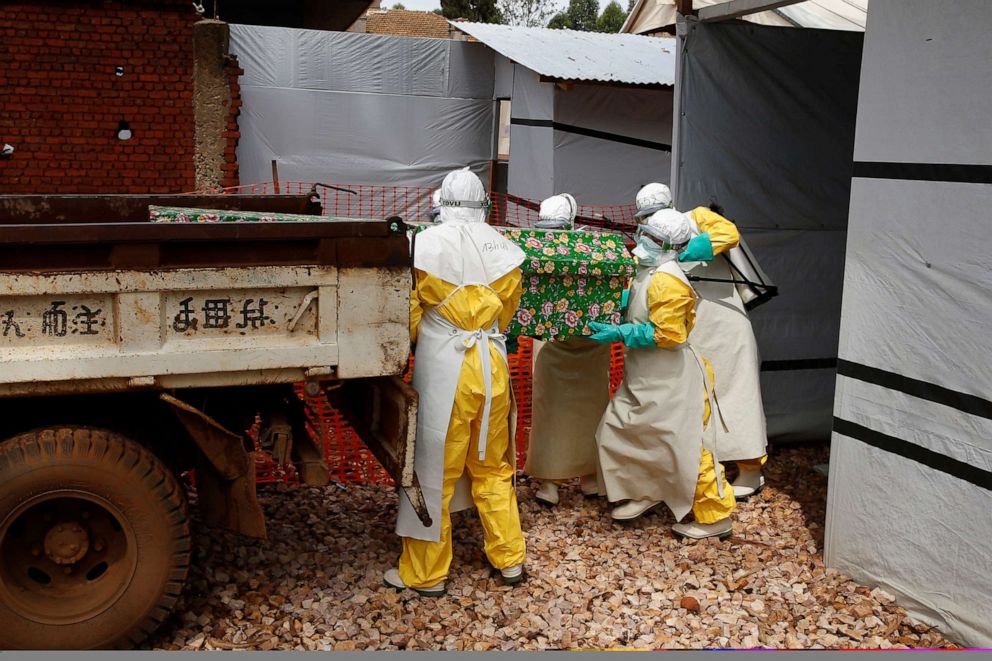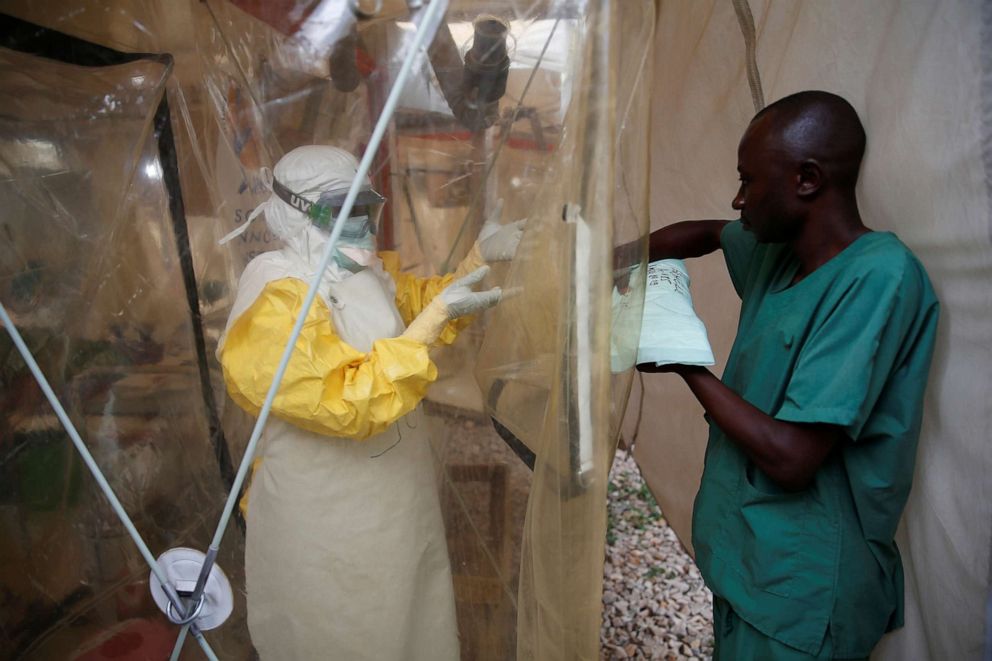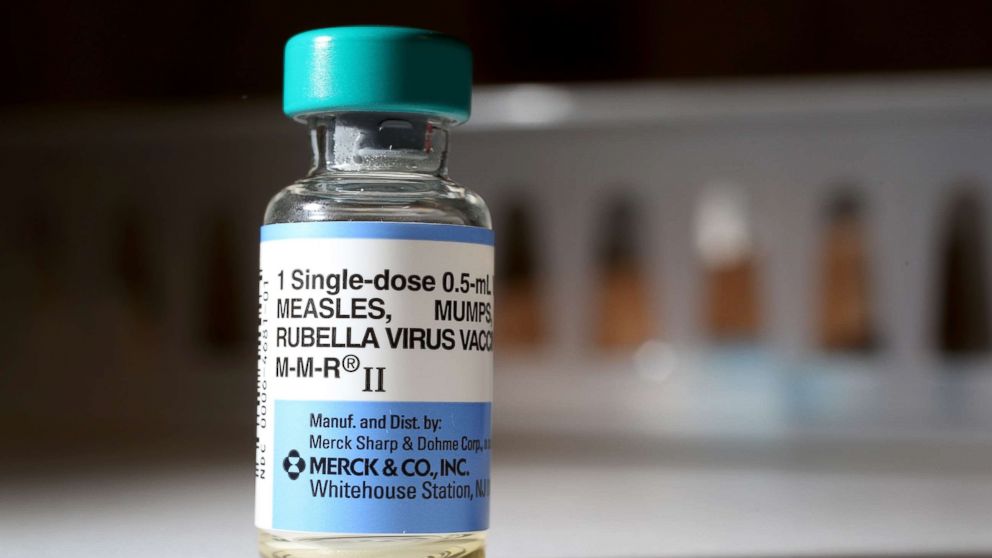Ebola-ravaged Congo now hit with 87,000 suspected measles cases, officials say
LONDON -- A measles epidemic has been declared in the Democratic Republic of the Congo, a country struggling to contain the world's second-largest and second-deadliest Ebola outbreak.
The Congolese health ministry said it has recorded 87,000 suspected cases of measles since the start of the year and laboratory tests so far have confirmed 677 of those cases in 23 of the nation's 26 provinces.
The newly-declared measles epidemic is believed to have already claimed the lives of more than 1,500 people, according to the ministry.
"Since the beginning of 2019, we have seen an increase in the number of suspected cases of measles," the Congolese health minister, Dr. Oly Ilunga Kalenga, said in a statement Monday night, officially declaring the epidemic. "This situation is all the more worrying because it represents an increase of more than 700 percent, compared to the epidemiological situation for the same period in 2018."
The Congolese health ministry said it recorded 65,098 suspected cases of measles for 2018, of which 2,908 cases were investigated and 961 were confirmed.
Measles is an airborne virus that easily spreads through coughing and sneezing. It causes fever, runny nose, coughing, red eyes and sore throat, followed by a rash. An infected person will start being contagious four days before a rash appears and will stop being contagious four days after rash onset, according to the U.S. Centers for Disease Control and Prevention.
The potentially-fatal disease is preventable by the measles-mumps-rubella vaccine.

In 2012, the Democratic Republic of the Congo launched a plan to stamp out measles by 2020. Routine immunization activities have intensified in recent years and mass vaccination campaigns have been organized in some provinces.
Yet, the health minister said "enormous challenges remain" in some provinces where children have difficulty attaining immunization services due to insecurity in the region, inaccessibility to vaccination sites, high population movement and vaccine resistance.
"More effective measures are needed to control this epidemic," Kalenga said.
More than 2.2 million children between the ages of 6 to 59 months were vaccinated against measles over a period of four days in April, and another mass vaccination campaign targeting over 1.4 million children will be launched "in the coming days," according to Kalenga.
“Vaccination is the only public health intervention that can end the measles epidemic,” he added. "In order to definitely interrupt the transmission chain of measles, at least 95 percent of the population must be immunized."
International humanitarian aid organization Medecins Sans Frontieres (Doctors Without Borders) warned in a statement Monday that the measles epidemic in the Democratic Republic of the Congo could become "the deadliest of this decade" without "massive and immediate mobilization."

The Democratic Republic of the Congo, which is roughly the size of continental Western Europe and has a population of 81 million, is also grappling with a growing Ebola outbreak.
A total of 2,062 people have reported symptoms of hemorrhagic fever in the Democratic Republic of the Congo's northeastern provinces of North Kivu and Ituri since Aug. 1, 2018. Among those cases, 1,968 have tested positive for Ebola virus disease, which causes an often-fatal type of hemorrhagic fever, according to Monday night's bulletin from the country's health ministry.
A third of those who have fallen ill are children, which is a higher proportion than in previous Ebola epidemics, according to the World Health Organization, the global health arm of the United Nations.
The current outbreak has a case fatality rate of about 67 percent. There have been 1,390 deaths so far, including 1,296 people who died from confirmed cases of Ebola. The other deaths are from probable cases, according to the Congolese health ministry.
This is the 10th outbreak of Ebola virus disease in the Democratic Republic of the Congo and the most severe seen in the Central African nation since 1976, when scientists first identified the virus near the eponymous Ebola River. It's also one of the worst outbreaks ever, second only to the 2014-2016 epidemic in multiple West African countries that infected 28,652 people and killed 11,325, according to data from the U.S. Centers for Disease Control and Prevention.
So far, no cases have spread beyond the two affected provinces nor across international borders. But the risk of national and regional spread remains "very high," according to the WHO.
North Kivu and Ituri, the provinces where people have been infected, are rife with conflict and displacement, and the local population has never faced an Ebola outbreak before. This is the first Ebola outbreak in history to occur in an active war zone.
An experimental Ebola vaccine developed by American pharmaceutical company Merck has helped keep the virus confined to the two provinces so far. Since Aug. 8, more than 131,000 people have been vaccinated against Ebola in the outbreak zone, according to the Congolese health ministry.




